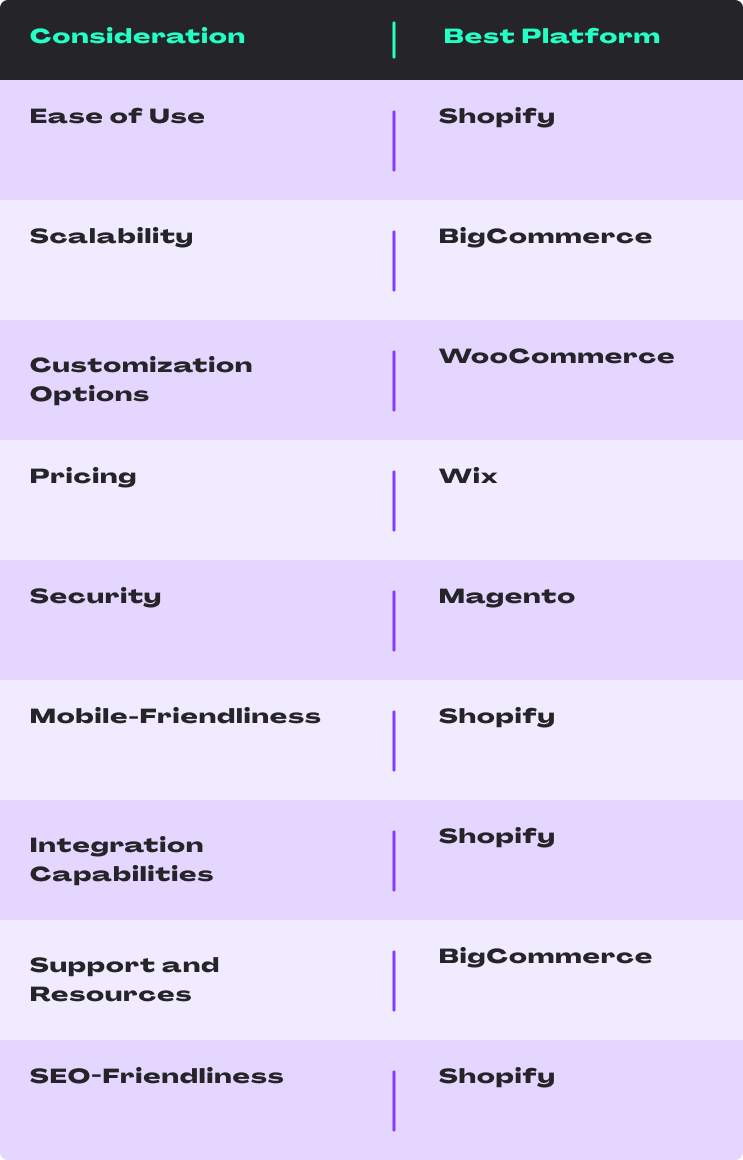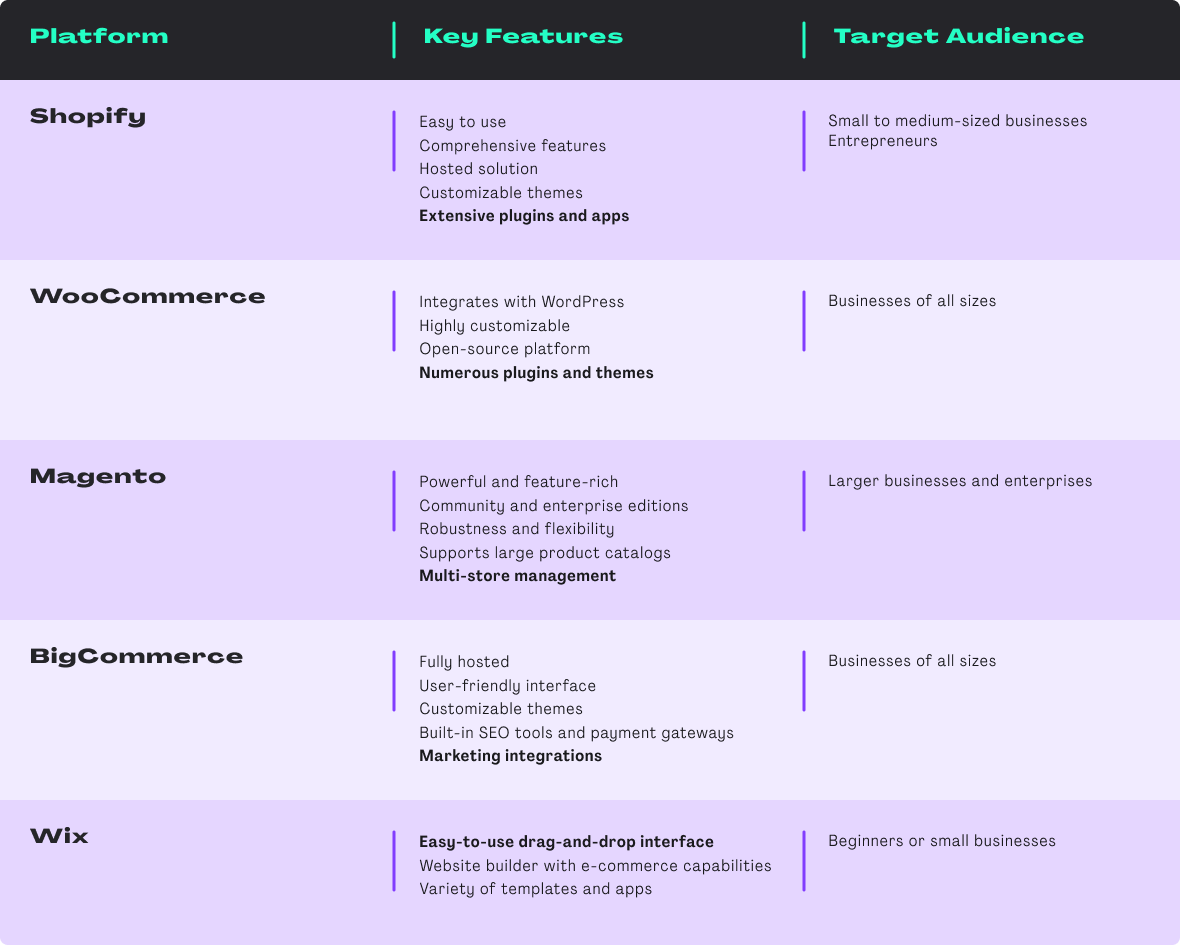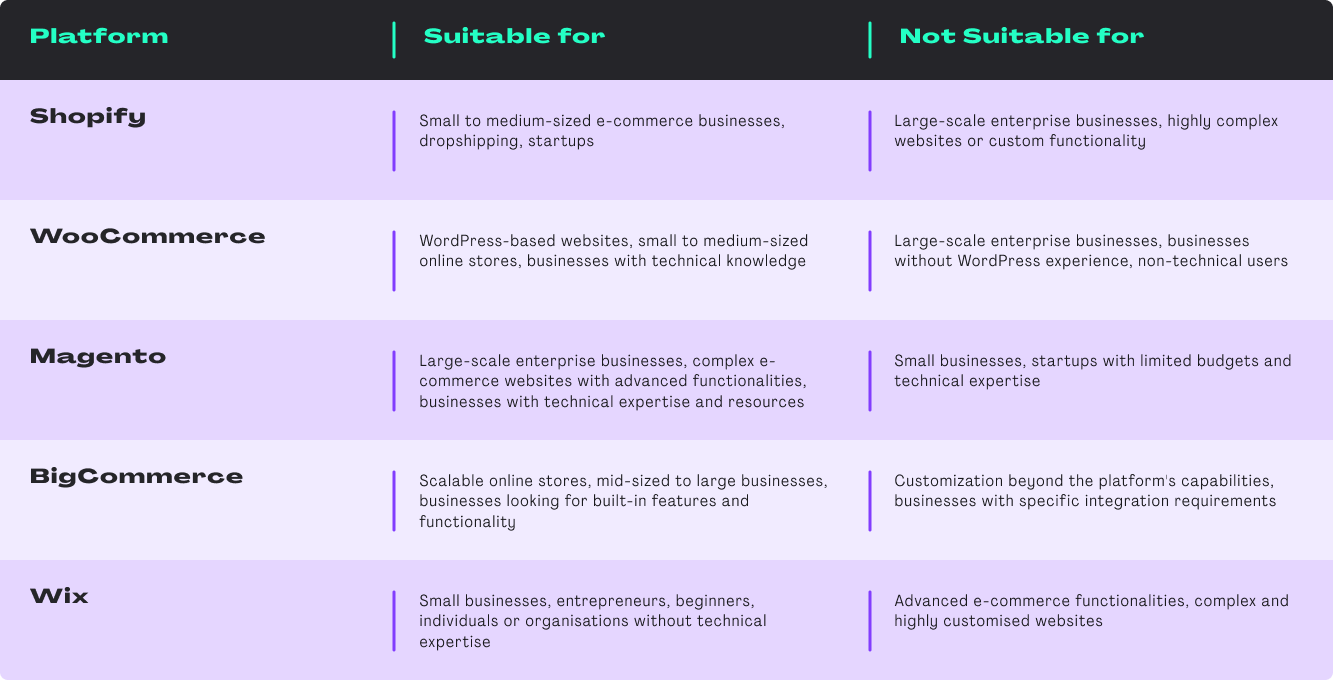Are you planning to launch an online store? Maybe you have your products or services ready to go but you’re a bit stuck as to which e-commerce platform to choose. An e-commerce platform is a software solution that enables you to build and operate online stores. They provide a framework for managing product catalogues, processing transactions, and facilitating customer interactions.
To make sure your online store thrives, you’ll want to provide your customers with excellent service and easy-to-use functionality. To do this, it’s important to choose the right e-commerce platform for your business. There are numerous platforms available in the market, each with its own set of features, capabilities, and pricing structures. Understanding the key factors to consider when selecting an e-commerce platform is essential to make an informed decision. In this blog post we’ll help you to make the right choice when deciding on which e-commerce platform will best suit your business’s needs.
Let’s start by taking a look at some of the main considerations to make when deciding on an e-commerce platform to use.

Key considerations for choosing an e-commerce platform:
Ease of use: The platform should be user-friendly and intuitive, enabling you to set up and manage your online store without requiring extensive technical expertise. Look for platforms with intuitive interfaces, drag-and-drop functionality, and easily customizable themes.
Scalability: Consider the scalability of the platform to accommodate your business growth. It should be capable of handling increasing traffic, inventory, and transactions without compromising performance. Scalability is particularly important if you anticipate rapid growth or seasonal fluctuations in demand.
Customization options: Evaluate the level of customization the platform offers to tailor your online store to your brand's unique requirements. Look for features such as customizable templates, flexible design options, and the ability to integrate third-party tools and plugins.
Pricing: Consider the cost structure of the platform, including setup fees, transaction fees, monthly subscriptions, and additional charges for add-ons or support. Choose a platform that aligns with your budget and offers a pricing model that suits your business's size and projected revenue.
Security: Ensure that the platform provides robust security measures to protect your customers' sensitive data, such as SSL encryption, secure payment gateways, and compliance with industry standards and regulations.
Mobile-friendliness: With the increasing use of mobile devices for online shopping, it is crucial to select a platform that offers responsive design and mobile optimization. Your online store should provide a seamless and user-friendly experience across various devices and screen sizes.
Integration capabilities: Consider the platform's ability to integrate with other essential business tools, such as inventory management systems, CRM software, email marketing platforms, and analytics tools. Integration capabilities can streamline operations and provide valuable insights for informed decision-making.
Support and resources: Evaluate the level of customer support provided by the platform, including documentation, tutorials, forums, and direct assistance. A responsive support system can be invaluable in resolving technical issues and helping you maximise the platform's capabilities.
SEO-friendliness: Look for platforms that offer built-in SEO features or the ability to optimise your online store for search engines. This includes customizable URLs, meta tags, sitemaps, and other SEO tools that can enhance your store's visibility in search results.

Reviews and recommendations: Research and read reviews from other businesses using the platform you are considering. Pay attention to their experiences, particularly those operating in a similar industry or with similar requirements. Recommendations from trusted sources can provide valuable insights into the platform's pros and cons.

Popular e-commerce platforms
Choosing the right platform for your online store is like finding the right business partner. Let us be your trusty guide, and introduce you to popular platforms for making it easier for you to find your e-commerce soulmate. Whether you're a small business owner with big dreams or a seasoned entrepreneur looking to expand, we're here to help you discover the platform that will bring your online store to life. So, let's dive in and find the perfect match for your e-commerce success!

Shopify:
Shopify is one of the most popular and widely used e-commerce platforms. It is known for its ease of use and comprehensive features. Shopify offers a hosted solution, meaning you don't have to worry about managing servers or technical aspects. It provides an intuitive interface, customizable themes, and a wide range of plugins and apps to extend the functionality of your online store. Shopify is an excellent choice for small to medium-sized businesses and entrepreneurs who want a user-friendly platform with built-in features like inventory management, payment gateways, and order tracking.

WooCommerce:
WooCommerce is a flexible and highly customizable e-commerce platform that integrates seamlessly with WordPress, one of the most popular content management systems. It is an open-source platform, allowing you to have complete control over your online store's design and functionality. WooCommerce offers numerous plugins and themes to enhance your store's capabilities. It is suitable for businesses of all sizes, particularly those already using WordPress or looking for extensive customization options.
Magento:
Magento is a powerful and feature-rich e-commerce platform that caters to larger businesses and enterprises. It offers both a community edition (open-source) and an enterprise edition (paid), providing scalability and advanced features. Magento is known for its robustness, flexibility, and extensive customization capabilities. It supports large product catalogues, complex pricing structures, and multi-store management. Magento requires more technical expertise compared to other platforms and is suitable for businesses with higher budgets and complex requirements.
BigCommerce:
BigCommerce is a fully hosted e-commerce platform that offers a range of features for businesses of all sizes. It provides a user-friendly interface, customizable themes, and built-in features like SEO tools, payment gateways, and marketing integrations. BigCommerce is known for its scalability and robustness, making it suitable for growing businesses. It also offers multi-channel selling options, allowing you to sell on multiple platforms like Amazon and eBay. BigCommerce is a good choice for businesses looking for a comprehensive and scalable solution without the need for extensive technical knowledge.
Wix:
Wix is a website builder that also offers e-commerce capabilities. It provides an easy-to-use drag-and-drop interface, making it suitable for beginners or small businesses with limited technical expertise. Wix offers a variety of templates and apps for e-commerce functionality. While Wix is primarily known for its website builder, it can serve as a simple e-commerce solution for small businesses with straightforward needs.
Each of these e-commerce platforms has its own strengths and target audiences. Take some time to check out the unique features and capabilities of each platform to see which one aligns best with your specific business requirements, budget, and growth plans.

Assessing platform features and functionality
Now that we’ve introduced you to a few of the top contenders of e-commerce platforms, let’s take a few minutes to assess the features and functionality of each. We’ll assess the different platforms according to product management, payment gateways, shipping options, SEO capabilities, analytics and reporting, mobile-friendliness and integrations and extensions.
Product management
Look for platforms that offer robust product management capabilities, including the ability to easily add, edit, and organise products. This includes features such as inventory management, product variations, bulk product uploads, and product categorization.
Shopify: Known for its intuitive product management system and user-friendly interface.
WooCommerce: Offers extensive product management capabilities, especially when integrated with WordPress.
Magento: Provides advanced product management features suitable for complex catalogues and pricing structures.
BigCommerce: Offers comprehensive product management capabilities, including support for complex catalogues.
Wix: Provides basic product management features, suitable for smaller-scale online stores
Payment gateways
Consider the available payment gateways and how they align with your customers' preferences. Look for platforms that support multiple payment options, including popular gateways like PayPal, Stripe, or Square. The availability of diverse payment gateways can enhance the checkout process and increase customer satisfaction.
Shopify: Integrates with over 100 payment gateways, providing a wide range of options.
WooCommerce: Supports multiple payment gateways, with numerous extensions available for additional options.
Magento: Offers multiple payment gateways and supports complex payment setups.
BigCommerce: Provides multiple payment gateway options and integrates with popular providers.
Wix: Offers multiple payment gateways for accepting online payments.
Shipping options
Evaluate the shipping functionalities offered by each platform. This includes features such as setting shipping rates, integrating with shipping carriers for real-time rates and tracking, and providing flexible shipping options like flat rate or calculated shipping based on weight or location.
Shopify: Offers built-in shipping options and integrates with major shipping carriers for real-time rates and tracking.
WooCommerce: Provides flexible shipping options and integrates with popular shipping carriers.
Magento: Offers comprehensive shipping features and integrates with major shipping carriers.
BigCommerce: Provides flexible shipping rules and integrates with popular shipping providers.
Wix: Provides basic shipping options, but may have limitations compared to other platforms.
SEO capabilities
Strong SEO features can help improve your online store's visibility in search engine results. Look for platforms that offer SEO-friendly features, such as customizable meta tags, URLs, and sitemaps. Integration with SEO tools or built-in SEO optimization can assist in driving organic traffic to your store.
Shopify: Offers built-in SEO features, including customizable meta tags, URLs, and automatic sitemaps.
WooCommerce: Leverages the SEO capabilities of WordPress, with customizable URLs, meta tags, and plugins.
Magento: Provides powerful SEO features and extensive customization options.
BigCommerce: Includes built-in SEO features, such as customizable URLs and meta tags.
Wix: Provides basic SEO tools and features, but may have limitations compared to other platforms.
Analytics and reporting
Consider the platform's analytics and reporting capabilities. Look for features that provide insights into your store's performance, customer behaviour, sales trends, and marketing campaign effectiveness. Robust analytics can help you make data-driven decisions and optimise your online store.
Shopify: Provides built-in analytics and reporting tools to track sales, customer behaviour, and marketing performance.
WooCommerce: Offers integration with popular analytics plugins, such as Google Analytics.
Magento: Provides comprehensive analytics and reporting for tracking various store metrics.
BigCommerce: Offers robust analytics and reporting features to monitor sales, customer behaviour, and website performance.
Wix: Provides basic analytics tools and reporting features to track website and store performance.
Mobile-friendliness
Many people now use their mobile devices for online shopping so it’s becoming increasingly important that your online store is optimised for this. Make sure the platform you choose offers mobile-responsive themes and a seamless mobile shopping experience. Ensure that the platform optimises your store for different screen sizes and provides a user-friendly interface on mobile devices.
Shopify: Offers mobile-responsive themes and ensures a seamless mobile shopping experience for customers.
WooCommerce: Provides mobile-friendly themes and the ability to optimise your store for mobile devices.
Magento: Offers mobile-responsive themes and supports a seamless mobile shopping experience.
BigCommerce: Provides mobile-responsive themes and ensures a user-friendly interface on mobile devices.
Wix: Offers mobile-responsive templates and strives to provide a user-friendly experience on mobile devices.
Integrations and extensions
Consider the platform's integration capabilities and available extensions or apps. Integration with other tools such as inventory management systems, email marketing platforms, or CRM software can streamline your operations and provide additional functionalities.
Shopify: Boasts a robust app ecosystem with a wide range of integrations and extensions to enhance the functionality of your online store.
WooCommerce: Offers a vast library of plugins and extensions to extend the capabilities of your store, including integration with popular tools and services.
Magento: Provides a rich selection of extensions and integrations to integrate with various systems and enhance the functionality of your store.
BigCommerce: Offers a wide range of integrations and apps to connect with third-party tools and services, allowing you to expand the functionality of your store.
Wix: Provides a marketplace of apps and integrations to add additional features and functionalities to your website and online store.
Customization and design options
To make sure your online store is in line with your branding and the overall look and feel of your company, you will need to design everything to your specific needs. You’ll need to check what different e-commerce platforms offer in terms of customization and design options. Below we’ll share some aspects that are useful to think about when deciding on which platform to choose.
Design flexibility
Look for platforms that offer a high level of design flexibility, allowing you to customise various elements of your store's appearance. This includes the ability to modify colours, fonts, layouts, and overall style to align with your brand identity. Let’s take a look at how each of the main platforms we’ve identified work around design flexibility.
Shopify: Offers a high level of design flexibility, allowing you to customise various elements of your store's appearance. You can modify colours, fonts, layouts, and overall style through the Shopify Theme Editor.
WooCommerce: Provides a high level of design flexibility, especially when integrated with various apps on your Wordpress website. You can customise your online shop by modifying colours, fonts and overall style.
Magento: Offers extensive customization options and flexibility, making it a preferred choice for businesses with advanced design requirements. You can deeply customise themes and templates, giving you full control over the appearance of your online store.
BigCommerce: Provides a range of customizable themes and offers a user-friendly interface for making design modifications. You can customise colours, fonts, layouts, and overall style to align with your brand identity.
Wix: Provides a user-friendly drag-and-drop website builder with a wide range of visually appealing templates. You can easily customise colours, fonts, layouts, and overall style through its intuitive interface.
Themes and templates
All platforms will offer various themes and templates to choose from. A diverse range of options can make it easier to find a design that matches your brand and provides a solid foundation for customization. Consider the quality, variety, and availability of both free and paid themes. Let’s see how the different platforms compare.
Shopify: Provides a diverse collection of professionally designed themes, including both free and paid options. You can choose from a wide range of themes that match your brand and provide a solid foundation for customization.
WooCommerce: Offers an extensive library of themes, both free and paid. Additionally, being built on WordPress, you can leverage the vast selection of WordPress themes available in the market for even more options.
Magento: Offers a variety of themes, including free and premium options. There is a good selection to choose from, allowing you to find a design that suits your brand and provides a starting point for customization.
BigCommerce: Provides a collection of customizable themes, including both free and premium options. Its theme marketplace offers a variety of designs, making it easier to find a template that suits your brand's aesthetic.
Wix: Offers a wide range of visually appealing templates that cover various industries and design styles. With Wix, you can easily find a design that matches your brand and provides a solid foundation for customization.
Customization tools
When choosing a platform for your online shop, you’ll want to check out their built-in customization tools. Look for intuitive interfaces and drag-and-drop functionality that empower you to easily customise your store without the need for extensive coding knowledge. The availability of visual editors and customization panels can enhance your design experience. How do the platforms we’ve identified compare in this regard? Let’s take a look…
Shopify: Offers an intuitive interface and drag-and-drop functionality through the Shopify Theme Editor. You can customise your store's design elements without extensive coding knowledge.
WooCommerce: Provides customization tools within the WordPress interface, allowing for easy modification of design elements through the use of plugins, page builders, and theme options.
Magento: Offers powerful customization tools and provides a rich set of options to modify the appearance of your store. It allows for deep customization through the use of its backend system and coding capabilities.
BigCommerce: Offers a user-friendly interface that allows you to customise your store's design using its built-in customization tools. You can modify colours, fonts, layouts, and other design elements with ease.
Wix: Provides an intuitive drag-and-drop website builder, allowing for easy customization of design elements. Its visual editor enables you to make changes to your store's appearance without the need for coding skills.
Branding and user experience
Consider how effectively the platform allows you to reflect your brand identity. Look for customization options that enable you to showcase your logo, brand colours, and unique visual elements consistently throughout your store. Also, consider how the platform supports user-friendly navigation, clear product presentation, and intuitive shopping experiences.
Shopify: Allows you to showcase your brand identity consistently throughout your store. You can upload your logo, customise colours and fonts, and create a cohesive brand experience. Shopify also provides features for user-friendly navigation, clear product presentation, and intuitive shopping experiences.
WooCommerce: Provides extensive branding options, allowing you to showcase your logo, brand colours, and unique visual elements consistently across your store. With its WordPress integration, you can leverage various WordPress plugins and themes to enhance user experience and create a cohesive brand presence.
Magento: Offers customization options to reflect your brand identity effectively. You can showcase your logo, maintain brand consistency through colour and font customization, and create a user-friendly shopping experience. Magento's advanced capabilities make it suitable for businesses seeking a highly personalised and branded store.
BigCommerce: Allows you to maintain brand consistency by customising your store's design elements, including uploading your logo, selecting brand colours, and customising fonts. It emphasises user-friendly navigation and clear product presentation.
Wix: Provides customization options to showcase your brand identity, including the ability to upload your logo, customise colours and fonts, and maintain a consistent brand experience throughout your store. Wix also focuses on user-friendly navigation and intuitive shopping experiences.

Integrations and third-party apps
You will likely want everything in one place when you set up your online store. Make sure to see how your chosen platform integrates external tools and services, and how their functionality and efficiency can enhance your online store. Consider the following aspects when evaluating e-commerce platforms in relation to integrations and third-party apps:
Importance of integrations: Assess the platform's ability to integrate with third-party tools and services, such as email marketing platforms, CRM systems, inventory management systems, accounting software, and more. Seamless integrations allow you to streamline your operations, automate tasks, and provide a better customer experience.
App marketplaces: Look for platforms that offer an extensive app marketplace or ecosystem. These marketplaces provide a wide range of pre-built integrations and third-party apps that can extend the functionality of your e-commerce store. Consider the availability and quality of apps that meet your specific business needs.
Compatibility: Ensure that the platform is compatible with the tools and services you currently use or plan to use in the future. This includes checking for direct integrations, APIs, or plugins that facilitate smooth data transfer and communication between different systems.

After our research, we’ve come up with what we perceive as the best platforms for integrations and third-party apps:
Best: Shopify - Shopify has an extensive app store, offering a wide variety of integrations and third-party apps. It integrates with numerous popular tools and services, including email marketing platforms, CRM systems, inventory management systems, and accounting software. Shopify's app store provides a robust ecosystem to enhance the functionality of your online store.
Runner-up: WooCommerce - WooCommerce offers seamless integration with WordPress, which provides access to a vast library of plugins. It allows you to integrate with popular tools and services by leveraging the WordPress plugin ecosystem. While the options may not be as extensive as Shopify's app store, WooCommerce still provides a solid range of integrations and extensions.
Other platforms to consider: Magento, BigCommerce, and Wix also offer integration capabilities and support for third-party apps, but they may have a comparatively smaller selection of available integrations and apps in their marketplaces.
Decision-making and finalising your choice
Choosing the best e-commerce platform for your business depends on various factors, including your specific needs, budget, technical expertise, and growth plans.
The table below outlines the suitability of different platforms for different types of businesses and should help you make the right decision:

Below is our breakdown of what we think each platform is best suited to, along with their advantages and disadvantages.
Shopify
Best for: Small to medium-sized businesses, beginners, and those seeking an all-in-one solution.
Advantages: User-friendly interface, extensive app store for integrations, reliable customer support, mobile-responsive themes, secure hosting, and scalability. It offers a comprehensive set of features suitable for various industries.
Disadvantages: Ongoing subscription fees and transaction fees for certain payment gateways, limited customization options compared to open-source platforms, and potential additional costs for advanced features.
WooCommerce
Best for: WordPress users, businesses seeking customization, and scalability.
Advantages: Seamless integration with WordPress, extensive customization options through plugins and themes, open-source flexibility, large user community, and access to numerous WordPress tools and resources.
Disadvantages: Requires more technical expertise, potential additional costs for premium plugins and themes, self-hosting requirements, and responsibility for security and performance optimization.
Magento
Best for: Large businesses, enterprise-level requirements, and those seeking advanced customization.
Advantages: Highly scalable and customizable, robust features for complex catalogues and pricing structures, extensive integrations and extensions, powerful SEO capabilities, and excellent performance for high-volume stores.
Disadvantages: Requires technical expertise and resources for setup and maintenance, higher development and hosting costs, complex learning curve for beginners, and potentially slower implementation timeline.
BigCommerce
Best for: Small to medium-sized businesses, entrepreneurs, and those seeking ease of use and built-in features.
Advantages: User-friendly interface, comprehensive built-in features, mobile-responsive themes, strong security and performance, scalable plans, and 24/7 customer support.
Disadvantages: Limited customization options compared to open-source platforms, transaction fees for certain payment gateways, potential additional costs for advanced features, and relatively smaller app marketplace compared to Shopify.
Wix
Best for: Small businesses, entrepreneurs, and those seeking a simplified, all-in-one website builder.
Advantages: User-friendly drag-and-drop interface, visually appealing templates, beginner-friendly customization options, built-in hosting, and domain registration. Suitable for businesses that prioritise simplicity and want an easy setup process.
Disadvantages: Limited scalability for larger businesses, fewer advanced e-commerce features compared to other platforms, potential constraints in design flexibility, and potential additional costs for certain advanced functionalities.
Setting up an online store might appear a rather straightforward task at first, but as we can tell from this article, there are many variables to consider! Make sure to weigh up the pros and cons of each platform in the context of your business requirements. You will need to be thinking of budget, technical capabilities, and growth plans while making your decision. Evaluate each platform based on factors such as ease of use, scalability, customization options, integrations, pricing, and support to make an informed decision. It’s a good idea to start experimenting with free trials, demos, or reaching out to customer support for further clarification before finalising your choice. We hope this article will continue to be useful as you research, set up or expand your online business.







